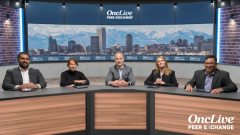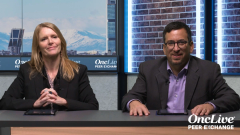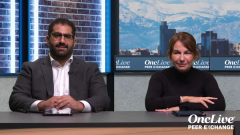
The Role of CTLA-4 Inhibitors in NSCLC
Experts on non–small cell lung cancer discuss the role of CTLA-4 inhibitors in the NSCLC treatment landscape.
Episodes in this series

This is a synopsis of a Peer Exchange video series featuring Benjamin P. Levy, MD, of Sidney Kimmel Comprehensive Cancer Center at Johns Hopkins; Solange Peters, MD, PhD, of University Hospital of Lausanne; Joshua K. Sabari, MD, of NYU Langone’s Perlmutter Cancer Center; Edward B. Garon, MD, MS, of UCLA Jonsson Comprehensive Cancer Center; and Marina Chiara Garassino, MD, of University of Chicago Medicine Comprehensive Cancer Center.
Dr Levy asked Dr Peters about her perspective on incorporating CTLA-4 inhibitors like ipilimumab. She responded that while the data is not high-level evidence, the most consistent finding across multiple trials is benefit in PD-L1–negative patients when adding CTLA-4 inhibitors to chemotherapy/immunotherapy regimens, with similar magnitude as in PD-L1–positive patients. Since PD-L1–negative patients derive little benefit from IO [immuno-oncology] alone, adding CTLA-4 blockade could address this unmet need. Dr Peters also noted possible extra benefit in patients with brain metastases and tumors with STK11/KEAP1 alterations that limit immunogenicity, though prospective data is needed.
Dr Sabari agreed on the rationale but prefers prospective trial data before adding CTLA-4 inhibitor toxicity. He mentioned an ongoing study evaluating chemoimmunotherapy with durvalumab/tremelimumab versus chemotherapy in difficult-to-treat patients with NSCLC [non–small cell lung cancer], including those with STK11/KRAS co-mutations. Dr Garassino concurred that more research focus is still needed on improving outcomes for PD-L1–negative patients, even if CTLA-4 inhibitors provide some benefit.
In summary, the expert panel discussed current evidence and rationale for CTLA-4 inhibitors in first-line NSCLC, particularly for PD-L1–negative patients, while noting the need for further randomized trial data given the added toxicity with CTLA-4 blockade.
*Video synopsis is AI-generated and reviewed by OncLive editorial staff.







































